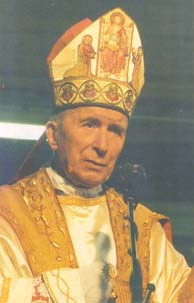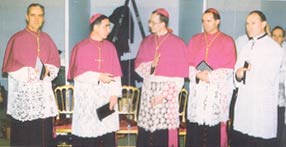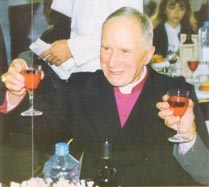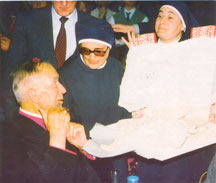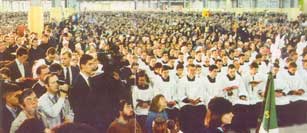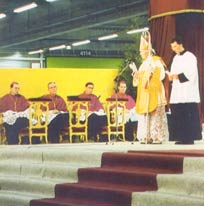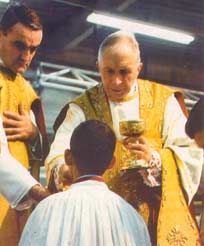In Defense of Archbishop Marcel Lefebvre and the Society of St. Pius X
|
The following is actually four articles (with an introduction) all dealing with Archbishop Marcel Lefebvre, the Society of St. Pius X, and the struggle with the Vatican. The titles for the four articles are: "There is No Such Thing as a Lefebvre Case," "Whoever Offends in just One Point is Guilty in All," "Oases of Catholic Life" and "The Wrong Way to Approach the Lefebvre Case." Several other subtitles are inserted for easier reading. The authors simply signed themselves as Eduardus, Raphael, Paulinus and Hilario.
|
A Reason for Hope or for Rebuke
On September 21, 1989, his Excellency Archbishop Lefebvre completed sixty years of priesthood. He spent many years prior to 1960 in Africa, firstly as a simple missionary, then as bishop and Apostolic Vicar of Dakar (Senegal), then again as Apostolic Delegate of French-speaking Africa and finally, since his apostolic activity had enabled Rome to set up the Catholic hierarchy in French-speaking Africa, as Archbishop of Dakar. When in 1962 his Excellency Archbishop Lefebvre hands over to an African bishop, formed by him, the See of Dakar, it seems that his mission is over. In reality a new mission is awaiting him. Already in 1960, Archbishop Lefebvre forms part of the Central Preparatory Commission for the Second Vatican Council: the mechanism about to start into motion which will turn him into a case—"the Lefebvre case." Yes indeed, because to be able to continue saying "yes" to the Catholic Church, Archbishop Lefebvre will have to say "no" to certain texts of Vatican II and to the Church's change of direction inspired by the (liberal-ecumenical) "spirit" of the Council. He will have to say "no" in the final analysis, to a Pope Paul VI, who, being a more passionate admirer of the Utopias of the non-Catholic Maritain than of the Catholic Truth, will, from the height of his sublime dignity as Vicar of Christ, promote the demolition of the Church being wrought by the neo-modernists. And he will, by entrusting to them the key posts in the Church, ensure the continuation of their predominance even after his death.
Again and again, for this "auto-demolition" of the Church which Paul VI will bring about and then weep over, but for which he will neither inquire after the causes nor seek the remedies, Archbishop Lefebvre will point out to the ex-Holy Office the causes and the men responsible. And he will work untiringly to go to the aid of souls in this time of crisis while preparing the rebirth of the Church. His new mission will bring him neither applause nor promotion, but in their stead, a series of canonical censures. However, that will not make him desist from fighting the good fight for the integrity of the Faith.
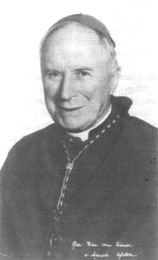 Archbishop Marcel Lefebvre |
"No," he would say in 1976, "I shall not give the Church's destroyers an easy conscience by handing over to them what belongs only to God, to the Faithful, to the Church of all time. This is what makes our situation with the Vatican appear deadlocked. But it is only an appearance. The time will come when the Church will triumph as she has always done... What are a few years, or few tens of years, compared with eternity? As I said to you a little while ago, all we need do is wait." ("No — Talks of Joseph Hann with Archbishop Lefebvre," ed. Stock, Paris).
And with this certitude, while the Church is plunging into a crisis unheard of in all her history, Archbishop Lefebvre founds seminaries and forms in them, Catholic priests for the Catholic Church. In the darkest hour, when modernist Rome shows that it truly does not recognize as its own, that Catholic Faith for the integrity of which Archbishop Lefebvre has for years been fighting, he will push his episcopal power to its limits. He will do this by transmitting the supreme power of Holy Orders to four bishops holding the Catholic Faith in its integrity—for the sake of his Fraternity and for souls in a state of emergency—but also and above all, "for the Church."
The whole life's work of Archbishop Lefebvre is an act of love for the unchanging truths of the Church, and an act of faith in the Church, which may be eclipsed for a while, but which will never permanently set so long as there is a single soul left to save. And that is why this person, without having sought any such thing, has become for everyone, whether they like it or not, an obligatory point of reference; a reason for hope or a reason for rebuke.
There is No Such Thing as a "Lefebvre Case"
A "Case" Despite Itself
Seen properly, there is no such thing as the "Lefebvre case." There has been talk of the "Lefebvre case" when in fact, there should have been talk of the "Paul VI case," meaning the case of a pope who, by sacrificing the Truth to a chimerical unity of "Christians," nay, of the whole human race, gave rise to a subversion of doctrine, of discipline and liturgy without precedent in all the long history of the Church. Without this subversion, Archbishop Lefebvre would never have become a "case:" he would have been a Catholic bishop like so many others, more holy and zealous than many others, but otherwise, as he had always been, in perfect submission to the Pope and in line with his colleagues in the Episcopate.
In the last years of his pontificate, Paul VI wept in public over the "auto-demolition" of the Church, over the "smoke of Satan" entering into the Church of God, over the "tempest" threatening the bark of Peter. He took good care, however, not to admit that the first axe-blow in the Church's auto-demolition had come from himself, that the Church's windows had been opened to the smoke of Satan by himself, that the bark of Peter had been steered into the eye of the tempest by his hand. Whichever way you look at it, it remains true that without the favour of Paul VI the modernists who maneuvered the Council and the post-Council could have done nothing, and it remains just as true that it was that "auto-demolition," that "smoke of Satan," that "tempest" threatening the bark of Peter which made Archbishop Lefebvre into a "case" against his will. Archbishop Lefebvre can in fact, state with a perfectly clear conscience that he has done nothing on his part to become a "case." He simply refused, as was his duty, to contribute the least little axe-blow to the auto-demolition of the Church, to open the least little fissure to the smoke of Satan, and he has resolutely steered away from the tempest which that part of the flock entrusted to his pastoral care.
He said with the utter simplicity characteristic of him in the famous sermon at Lille: "I have done nothing other than what I did for thirty years of my priestly life, which earned me the post of Bishop, Apostolic Delegate in Africa, member of the Central Pre-conciliar Commission, Assistant at the Pontifical throne. What more could I ask for by way of proof of Rome's esteem for my labors and their usefulness to the Church and the good of souls? Yet here and now, while I am carrying out a work similar in all respects to what I was doing for thirty years, I am suddenly suspended "a divinis", I may well soon be excommunicated—driven out of the Church, repudiated—Heaven knows what!"
"How can it be? So what I did for thirty years was also deserving of suspension 'a divinis'? On the contrary, I think that had I then formed seminarians as they are being formed today in the new seminaries I would have been excommunicated; had I then taught the catechism that is being taught today, I would have been called heretical. And had I said Holy Mass as it is being said today, I would have been suspect of heresy. I would also have been said to be out of the Church. So I just do not understand. Something has changed in the Church..."
The Nub of the Question
"We are told, 'You are alone and isolated.' Not at all! We have on our side all the Church's past, hundreds of Popes, all the saints and all those who did what we are doing... We should have no fear, we are built on a rock which does not depend on us. If it depended on us, we might be afraid: then it would be me, it would be my ideas. I would have invented something; I would have given rise to something new. But that is not so. That is not the case with us." Thus spoke the Archbishop to his seminarians in September of 1988, touching on the nub of the whole question revolving around his person.
It is not Archbishop Lefebvre who introduced anything new into the Church. The liturgy celebrated in his priories is the Traditional Liturgy of the Roman Church. The theology taught in his seminaries is the theology which "new theologians" scornfully call "Roman theology." The spiritual formation of his seminarians is based on the ascetical rules laid down by the great masters of the spiritual life in the Church. The religious orders founded by him, or which lean on him, follow the rules which the age-old wisdom of the Church has established or approved.
Archbishop Lefebvre has no personal ideas or innovations needing to be justified: everything he says has the entire Magisterium of the Church behind it. Everything he does has the whole past of the Church to justify it. Hence, whoever follows him—to borrow an expression of St. Vincent of Lerins—receives Archbishop Lefebvre with the Church and is not abandoning the Church to follow Archbishop Lefebvre (Commonitorium #17).
"We," said Fr. Thomas Aquinas to Dom Gérard, "are not following Archbishop Lefebvre or Bishop Castro de Mayer because they are Archbishop Lefebvre and Bishop Castro de Mayer, but because they are for us the heralds of the Faith of all time and are carrying it on. Were they ever to abandon that Faith, we in turn would abandon them."
It is up to the innovators, those who have launched or imposed personal ideas, who have invented something, who have given rise to something new in the Church, it is up to them to justify these novelties by demonstrating, if they can, that these rightly belong within the Church as being in line with everything the Church has always believed and taught, and not in opposition to it, as on the contrary they obviously are.
The "Paul VI Case"
Therefore, Archbishop Lefebvre, while being pointed out to listeners and readers ignorant of the facts as a "case," in fact points back to the real case: the case of a pope whose program, as Giulotti says, could be summed up in the formula "Modernizing Christianity in Order to Christianize Modernity" (Dust of Exile, 1928). This was already the program of the modernism condemned by Pius X as the synthesis of all heresies and as the direct road to atheism. "But let it suffice here," he wrote in Pascendi, "to realize by how many ways the doctrine of modernism leads to atheism and the destruction of all religion. The error of the Protestants took the first step along this path; the second was taken by modernism; within a short distance atheism must follow." And the sad examples of the post-conciliar Church, governed by the modernists, are there to testify how clear-sighted and far-seeing the Pontiff Saint was.
Paul VI, on the contrary, blinded by his Utopia, did not hesitate to place his authority, supreme within the Church, at the service of modernism. Hence a series of "orders to obey" imposed in the name of the Church and which have in fact enfeebled or destroyed within souls, together with the Faith of the Church, their faith in the Church.
It is Not the Church
"But it is not the Church," said Archbishop Lefebvre in his Rome conference of June 6, 1977. "It is not the Roman Catholic Church which is doing all this." It is true: it is not the Catholic Church. The Church is always holy, even when it has sinful members, because the faults of its sons, of its ministers, of the very successors of Peter, are in fact personal faults in no way imputable to the unchanging principles of the Church. The defectibility of free will, which remains even in the successors of Peter, can mean that the person of the Pope shirks the duties of his own office: "persona Papae potest renuere subesse officio Papae," wrote Cajetan, who had seen the pontificate of the Borgia pope (in 2a 2ae, q39, al, n6).
When the deficiencies of the pope concern morals, the Church already undergoes a tremendous testing. So when the person of the pope, contrary to the very purpose of his office, abuses the authority proper to him in order to give way to innovations adulterating the Faith, with the intent of pleasing "those far from us", and in the illusion of Catholicizing them without converting them, then one can well say that the Church's enemies have solved their version of Archimedes' problem. A point of leverage has been given them on which they can lean, to demolish without effort the one true Church: the auto-demolition of the Church then comes about in the name of God and obedience due to the Vicar of Christ upon earth.
"Vatican II," said Archbishop Lefebvre to his seminarians in September of 1988, "is a fruit, a result rather than a beginning. However, the Council was unfortunately a beginning; at least in the Church's legislation this multiplied by ten the forces of evil, because the Church assumed responsibility when those who are at the head of the Church assumed responsibility for a liberal reform; a revolution within the Church.
And in truth, we are in a position today to measure the strength taken on by a deviation imposed within the Church in the name of the supreme visible authority. This is because the infidelity to the mission of Christ spreads downwards from the head to the members: bishops, priests and faithful. The number of deceivers and deceived multiplies: the poison of error and immorality works with nothing to stop it. All that Catholics remaining faithful can do is make a list of the ruins.
The Broken Mirror
How can we not think in such sad times, of the Blessed Virgin's message at La Salette? "The heads, the guides, of the people of God have neglected prayer and penance, and the devil has clouded their minds: they have become those falling stars (of the Apocalypse) which the ancient adversary, the devil, will drag down with his tail to destruction. Many will abandon the Faith and the number of priests and of religious who will leave behind the True Religion will be great... The Church will undergo a horrendous crisis. The Holy Faith of God having been forgotten, each individual will seek to be his own guide, and superior to his equals. The Church will go into eclipse."
This message, although approved by Rome, was then given the same treatment as the Third Secret of Fatima: the Holy Office almost immediately forbade any further publication or divulgation of it, on the grounds that it gave rise to criticisms of Church authority. It must be said that, with the messages of the Blessed Virgin, while they presented such guarantees of authenticity as to oblige the Church to recognize them, nevertheless the members of the hierarchy behaved like that invalid who, instead of taking the necessary medicine, smashes to pieces the mirror showing him on his face the signs of a deadly illness.
Logically, the suggested supernatural remedies not having been taken, the crisis of faith diagnosed by the Blessed Virgin at La Salette has spread from the heads down to the people, and today it is an epidemic wreaking havoc in the Catholic world, where ministers of the Church, the Faith having been killed in themselves and in others, rush headlong to their ruin, dragging with them the souls it should be their duty to save. No, we need not wait for visible and material signs; the chastisement foretold by the Blessed Virgin at La Salette, and then at Fatima is already upon us. A dark cloud is enveloping the Church, "column and foundation of the Truth," souls are groping in the dark; individuals and societies are plunging downhill, from one corruption to the next.
Generalized Apostasy
Present-day Catholicism, wrote Manuel de Corte in 1971, a Belgian philosopher and professor at the University of Liege, "is prey to a generalized apostasy; there no longer subsist within it any other than scattered groups of healthy supernatural cells, which, in their turn, risk undergoing corruption if they are not warned of the peril in time (preface to Teilhard the Apostate of R. Valnéve, Rome).
Precisely, Archbishop Lefebvre has only found himself to be a "case" because he refused to shirk his duty of warning souls of this peril. Very soon he was to lament with Elias, "I alone remain from amongst the prophets of the Lord."
On April 13, 1978, he would write to Cardinal Seper:
"Most Reverend Eminence, I cannot believe that you do not understand the exact motives my attitude, which is that of thousands of Catholics and numerous priests amongst those most faithful to the Catholic Church and to the Pope... We do not wish to become liberal ecumenists, and by so doing, betray the cause of the Reign of Our Lord and the cause of the Church. We wish to remain Catholic ("Archbishop Lefebvre and the Holy Office," ed. Volpe, Rome, pp. 97 ss.).
In truth, it is not that Cardinal Seper did not understand the motives of the attitude of Archbishop Lefebvre. Only, with Paul VI favoring the auto-demolition of the Church with the full weight of the authority he received from Christ to build it up, Cardinal Seper, like so many others, could not or would not summon up the courage to resist him. Thus, Archbishop Lefebvre found himself alone in saying what others were thinking to themselves but not saying out loud, and by so doing he became a "case."
Conscious of waging an unequal struggle against an auto-demolition of the Church, being carried out in the name of "obedience" to the Pope, Archbishop Lefebvre prepared for the worst.
"Who is the instigator," he asked in the above-mentioned letter, "of this false ecumenism in the Church? Who is the man or men responsible? We prefer not to know. God knows their identity. But while we may be struck with all the interdicts and Church censures there are, we still intend, with the grace of God and the assistance of the Virgin Mary, to stay in the Catholic Faith, and we refuse to collaborate in the demolition of the Church" (same letter).
Little Flock
A few days before Paul VI's death—as Jean Guitton revealed Paul VI "preoccupied by the gathering strength of non-Catholic thinking within the Church" said, "A little flock must carry on, however little it be" (30 Days, November 1986).
That is a wholly Catholic thought: the Church is indefectible and so even in the most horrendous crises, even in the darkest eclipses, there is a "little flock," a "remainder," which keeps the Faith of the Church intact. God alone knows the exact number of this flock, just as God alone knows the hour when from this little flock the Church will blossom again in all its beauty. But the part of this "little flock" that had shown itself to Paul VI, he persecuted and struck down implacably, simply because it had committed the offence of demonstrating with the Seminary of Ecône that the auto-demolition of the Church, over which Paul VI himself wept, would never have happened if, instead of following his liberal-modernist-ecumenical chimeras, Paul VI had encouraged the one and only reform needed by the Church—the restoration of the Catholic priesthood.
"Whosoever Offends in Just One Point is Become Guilty of All"
Archbishop Lefebvre is loved and venerated by those faithful, and they are especially numerous in France, Switzerland, Germany, Latin America, etc.—to whom he has given back that spiritual home that was snatched from them by the demonic whirlwind of the conciliar "aggiornamento," Vatican II's up-dating of the Church. As far as the hierarchy today is concerned he is officially "schismatic" and "excommunicated," nor could it be otherwise. We would be foolish indeed to expect those responsible for the crisis in the Church and for its prolongation to recognize the state of emergency which they have brought souls to, and which induced Archbishop Lefebvre in this extraordinary situation of the Church to resort to an extraordinary use of his episcopal powers (see the July 1988 Angelus). However, between those who venerate and those who condemn Archbishop Lefebvre, there are two more reactions to it. Firstly, those who have difficulty in sharing Archbishop Lefebvre's judgment on the Church's present course; secondly, those who remain perplexed at the initiatives stepping out of the ordinary. The Faith is either integral or not at all: of these, the former say that not everything is ruined. There is still something healthy in the Church. However, people who think like this forget that partial health means nothing when it is a question of the Faith.
"The Arians, the Montanists," writes Leo XIII, "had not dropped the whole of Catholic doctrine, but only this or that part of it: and yet it is well-known that they were declared heretics and expelled from the bosom of the Church" (Satis Cognitium). The reason could not be more simple: "Such in fact is the nature of the Faith that it cannot subsist if one dogma be allowed and another disallowed." The Church professes the Faith to be "a supernatural virtue, by means of which, inspired and helped by God's grace, we believe those things to be true which He has revealed to us; we believe them not through the intrinsic truth of these same things known to us by the natural light of our reason, but through the authority of God Himself revealing them, Who can neither be deceived nor deceive" (Vatican I Sess. 3 c. 3 D 1789).
"If then, one knows a truth has been revealed by God, and one still does not believe it, it follows that in reality one believes nothing by Divine Faith." The reason is that the judgment delivered by St. James regarding offences in the domain of morals must apply also to errors of thought in matters of faith: "Whosoever shall have offended in one point alone, is become guilty of all" (James II, 10). Nay, it must apply all the more to errors of thought. For in fact, it is less proper to say that the whole moral law has been violated by someone who broke it in only one thing, given that one cannot necessarily see in him—unless one makes suppositions about his intentions—a scorn for the majesty of the law-giving God. On the contrary, he who ever on just one point of Faith does not assent to the truths revealed by God, has lost the Faith entirely, since he is refusing to submit to God, Supreme Truth and proper motive for believing the Faith. "In many things," says St. Augustine, "they agree with me; in some they do not agree with me; but because of the few things in which they disagree with me, the many in which they agree with me are of no use to them" (Enarrat. in Ps. 54, n. 19).
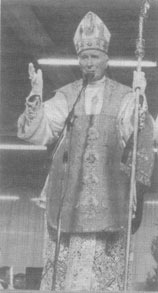 |
And rightly so; because those who take from Christian doctrine only what pleases them, are relying not on the Faith, but upon their own judgment: and by refusing to "bring their intellect into subjection to Christ" (I Cor. X, 5), they are in reality obeying rather themselves than God. Augustine said, "You who believe what you like in the Gospel, and do not believe what you do not like, are believing rather in yourselves than in the Gospel" (Bk. 17 Contra Faustum c. 3; Satis Cognitum).
"For this reason," writes Leo XIII, "the Church, mindful of its duty, has never wearied itself over anything with so much zeal and effort as over guarding the integrity of the Faith in every single one of its parts" (Satis Cognitum).
Today, in the storm which has turned the Catholic Church upside down, ever since Paul VI opened its doors to the modernists who had for some time been pressing against them, the integrity of the Faith has become an empty word, meaningless for most people, as is indicated by the fact that anyone still speaking of the integrity of the Faith is taxed with "integrism." And yet, the Catholic Faith—the Church teaches—is either integral or it is not at all. Where the Faith is concerned there can be no such thing as "integrism," i.e., there can be no excess in keeping it in its entirety, just as the Church has never considered it was being excessive when it labored "with all zeal and effort... to guard the integrity of the Faith in every single one of its parts" (Leo XIII, Satis Cognitum). To content oneself with remnants of the Faith is no use to the Church. Any Protestant sect keeps certain remains of the Catholic Faith, but the integrity of the Faith belongs properly and only to the one True Church of Christ.
Faith and Obedience
The second of the intermediate reactions given above, while understanding the motives for Archbishop Lefebvre's resistance, is disturbed at his being in conflict with the Roman authorities. For people who think like this—even if they do not say so out loud—obedience is more than the Faith. In fact, exactly the opposite is true: obedience is at the service of the Faith. Even the Papacy is at the service of the Faith and the episcopal ministry is at the service of the Faith. The Church itself exists first and foremost to guard, defend, explain and hand down the Faith, in its integrity. A hierarchy asking for "obedience" to an orientation of the Church imposed in fact through indications never clear enough and always ambiguous enough to destroy or at least enfeeble the Faith, is an hierarchy which has failed in its fundamental duty, and is abusing its power. The Catholic obeys the Pope, the bishops, and the priests first and foremost, to keep the entire Faith intact and not to trade it off in part or in whole. In such circumstances the resistance of Catholics is not only a duty, it is a necessary premise for the Church's rebirth.
For an Extraordinary Situation, Extraordinary Remedies
In truth, those who remain perplexed at Archbishop Lefebvre's course of action, are refusing to recognize the extraordinary gravity of the crisis of the Faith which has enveloped the Church, by enveloping the men of flesh and bones who constitute and govern it. And yet to realize at least partly just how extraordinary is the situation of the Church in our day, it is enough to consider:
-
that a bishop, Archbishop Lefebvre, to be able to keep for himself and for others the integrity of the doctrine handed down by the Church as certain until Vatican II, had to go and beg from a Pope, Paul VI, without success, for the liberty to continue the "experiment" of Tradition, which the very same Pope by divine mandate should have been guarding and defending...
-
that the same bishop, in view of a "reconciliation," had to go and ask on behalf of himself and others from the Roman authorities, without success, for "guarantees" to preserve the integrity of the Faith constantly, until then kept in the Church, which those same authorities should have been guarding and defending...
-
that the free rein for the "experiment of Tradition," denied for years to Archbishop Lefebvre, has been granted, within limits in the liturgical domain, only after Archbishop Lefebvre went ahead with the episcopal consecrations, and precisely because he had gone ahead with them, and this was granted with the sole purpose of detaching from him the greatest possible number of "Traditionalists"...
-
that the "Traditionalists" who accepted the Vatican's proffered hand, thereby reaping advantages for themselves where Archbishop Lefebvre had gathered an excommunication which was meant also for them, are considered by modernist Rome, because of the Catholic Faith which they have kept intact up until now, as a distinct species, a rare species of the process of becoming extinct: Catholics "with classical feelings," as Cardinal Ratzinger defined them...
-
that these "Traditionalists" have no other value for the Roman authorities than that firstly, of justifying in front of public opinion their own behaviour towards Archbishop Lefebvre, by demonstrating—after the event—that there was no "state of emergency" to warrant his going ahead with the episcopal consecrations; and secondly, of functioning as a "looking-glass for the larks" for all those who recognize Archbishop Lefebvre's positions as their own.
-
that these same "Traditionalists," despite giving the impression of having confined to the liturgy alone their attachment to Tradition, thus leaving the Church's demolishers with an easy conscience for everything else they are demolishing, are nonetheless disliked and opposed by bishops, theologians and laity "committed" to the Church's new course. For these say, condemning themselves out of their own mouth, that the new rite of Mass expresses a different faith.
This aversion of those presently holding authority within the Church for all who remain faithful to the doctrine handed down as certain by the Church until Vatican II, is the clearest indication of that crisis of the Faith which has enveloped the Catholic world from top to bottom. It is the proof of the real existence of the state of emergency for souls exposed to the gravest peril, the peril of losing the Faith which is "the beginning of human salvation, the foundation and root of all justification" (Council of Trent, D. 801). Hence, this aversion justifies also the extraordinary use made by Archbishop Lefebvre of the episcopal power which is his, to guarantee to souls, for as long as the crisis in the Church will last, the means they need to hold onto their Catholic Faith.
What Hopes?
The hopes of Archbishop Lefebvre and of all those resisting in the Catholic Faith, are the hopes of the Church itself. Paul VI spoke of the "auto-demolition" of the Church—improperly—because the Church does not demolish itself, even if it can undergo very difficult trials through the infidelity of its own ministers. The Church, which by God's promise cannot fail, will eventually re-establish, as it always has done, the integrity of the Faith; scattering all its internal enemies together with their errors.
Then, as Archbishop Lefebvre wrote to the Holy Father in his last letter, Rome, presently infested with modernism, will return to being the Catholic Rome of all time, and the problem of the "reconciliation" of Archbishop Lefebvre and of all the so-called "Traditionalists" will no longer exist, simply because the whole Catholic world will have recovered what Archbishop Lefebvre and the "Traditionalists" never lost: the integrity of the Catholic Faith.
Oases of Catholic Life
A Forecast Proved Wrong
Such was Cardinal Gagnon's, when a while back, he declared that the episcopal consecrations of Archbishop Lefebvre would cause a considerable defection amongst the faithful. His forecast was based on the attachment to Rome and to the Pope, which as visitor he had had the opportunity to see in those Faithful. His forecast was, however, amply proved wrong by the facts, as even the press recalled on the anniversary of the episcopal consecrations. In fact, despite their attachment to Rome and to the Pope, despite the clamor raised over a non-existent schism and the invalid excommunication they too were threatened with, those Faithful have continued to frequent the priories directed by the priests of Archbishop Lefebvre. In so doing they have, as far as they are concerned, testified in the most eloquent fashion to the real existence of that state of emergency to which Archbishop Lefebvre appealed when he went ahead with the episcopal consecrations without the normal mandate from the Pope.
"Miereor Super Turbam"—what do the Faithful find in the priories of Archbishop Lefebvre? Oases of Catholic life. And what do they see outside, all around them? a desert of the Faith.
The so-called "People of God" are living today in ignorance, in indifference, in a lack of respect for the most sacred things, and they are going down that "broad way" that leads to perdition. Souls are living in an extreme spiritual poverty: those who are thirsting for clear and firm doctrine find nowhere and no-one to give it to them; those who are striving to keep the spirit and some form of Catholic piety, are laughed at as being backward and attached to medieval forms of devotion, they are even persecuted in such a way that, deprived as they are of any support, they not infrequently require a heroic courage to persevere in the Faith. In truth, never was the Catholic people's misery so great or so universal. Great, because Faith is the first of the theological virtues without which no other virtue can subsist; universal, because the crisis of Faith, coming down from the summits of the hierarchy, has spared nothing and nobody.
Iniquity Came Out From the Ancients That Seemed to Govern the People
(cf. Dan XIII, 5)
A Pope who has placed the supreme authority of Peter's Successor at the service of his liberal-modernist-ecumenical illusion; theologians cultivating a "theology" without God, puffed up with vain knowledge with which they have fed beyond all measure their vanity and pride, denying or twisting the Word of God and the Church's Magisterium; bishops who are either accomplices or cowards or indifferent at the disarray of souls and their extreme need, some of whom are committed to protecting and exalting the masters of error and their false doctrines, others of whom are induced by their little faith to let pass as of no importance such numerous sins against the Faith, priests who either betray their own mission or do not take it seriously, having their priestly zeal paralyzed by doubts against the Faith: such are those principally responsible for the extinction or enfeeblement of Faith amongst the people of God.
The Collapse of the Faith
The crisis of subjective Faith in people's hearts and minds by which they believe, shows up in the doubts and denials surrounding every Mystery of the objective Faith to be believed: original sin denied, the Divinity and Resurrection of Our Lord Jesus Christ denied or questioned in the Pontifical Universities themselves and in the pseudo-Catholic publications; the mystery of the Holy Eucharist desacralized in a rite of Mass which is ambiguous, hasty, cold, empty, unrecognizable and profaned by practices such as Communion in the hand which kill off in souls the reverence due to the body of God made Man; the sacrament of Confession devalued, neglected and supplanted by useless ceremonies of General Absolution; the cult of the most Holy Virgin, to whose Immaculate Heart God attached at Fatima the salvation of the world, placed in the shade; the sublime privileges of Mary denied; the primacy of the Roman Pontiff as contested as his personality is adulated and—what is worse—that primacy remaining unused by the Successor of Peter himself; the one true Church, outside of which there is no salvation, unrecognized as such by her own sons and ministers; the existence of the angels, good or evil, denied or forgotten; the cult of the saints completely neglected; Judgment, Hell and Heaven denied or passed over in silence.
In the Vacuum of the Faith, the Opening to the World
Together with the unchanging certainties of the Faith there collapsed also, inevitably, Catholic piety and the practice of religion and Christian life.
The "opening to the world" came along to fill the vacuum left by the supernatural: once Heaven and Grace are denied or lost from view, only earth and man have any value. The ministers of God speak today the same language as the godless world: man is more important than God, and man's social and economic problems, like his plans and efforts for well-being on this earth, count more than his supernatural last end: it is the spirit of the world in the Church of God. Even the liturgical rites and the sun of the Catholic Liturgy, which is the Holy Sacrifice of the Mass, are reduced to little more than a worldly meeting; an occasion for the "president" and his "assembly" to get together and to show off. In truth, nowadays, when the Faithful are not being given error and evil, they are being given, from the religious point of view, absolutely nothing. To suit "modern man," who does not want God, they tried to fabricate a "modern religion," without God, without prayer, without sacrifice, without any beyond, without Heaven and without Hell; all of which amount in brief to the negation of all religion and even of all human dignity, for man's life has, without eternity, neither sense nor purpose.
Archbishop Marcel Lefebvre
Following in His Grace's footsteps (L-R): Bishops Williamson, de Galarreta,
Tissier de Mallerais, Fellay and Superior General Fr. Schmidberger.
A toast is in order. Archbishop Lefebvre has spent over 60 years as a priest and over 40 as a bishop.
A priceless gift—the rochet of St. Pius X.
The huge crowd that attended the jubilee.
The four bishops whom Archbishop Lefebvre consecrated in June, 1988, listen intently as His Grace delivers the homily. The MC of the Mass stands to the left of the Archbishop.
It is a great joy to His Grace that he was able to give Our Lord to so many souls in the past 60 years. Here he gives Our Savior to one of the young altar boys; assisting is Fr. Simoulin, Superior at Ecône.
The crisis of Faith and the spirit of the world, precisely because they are favored by the highest members of the hierarchy, have not spared the religious houses, which, being ever more full of the world and more empty of God, have, from places of prayer and interior life, become places of decadence and even of scandal.
The few priests and religious that are still pious and that deplore the dismantling of the Faith and of religious life, are persecuted and reduced to isolation; their concern for the Church is made an object of mockery.
Very few people, almost all of them layfolk, have remained to defend with the spoken or written word the integrity and purity of the Catholic Faith. The horrendous impoverishment of church worship and church buildings gives testimony against this faithless age, for indeed the beauty, decorum and splendour of the Churches and of worship have distinguished in Church history all the ages with a living Faith.
Ecumenism, or, "Relaxation" Within the Church
The ecumenism which will gladly pass the truth over in silence or water it down or make it more comfortable, with the mistaken idea of thus promoting unity with our "separated brethren" or the whole human race, this ecumenism too testifies to the loss or at least to an appalling weakening of the Faith.
This ecumenism, the principal lever of the Church's self-destruction answers perfectly to the modernists' purpose as admitted to by Loisy in his memoirs: "Modernism had no need to set up one doctrine opposite another, or to found any new church in opposition to the old Church. The Church already existing was like its starting-point and the object of its action. Modernism had no urgent need to get a new creed accepted or to get the Church's centuries-old organization repudiated: all it wanted was to get the Church to relax its uncompromising attitude." (V. II p. 568).
However, for the Church, or rather, for churchmen, to relax their "uncompromising attitude" in confronting error, it was necessary for them to stop believing or at least to believe only very little.
The Horizon is Still Dark
Nor is there to be seen amidst so much darkness the dawn of any re-birth: the Faith of future generations is undermined by the new catechisms which inject denial, doubt, and hence, disbelief—even in children—while the "new" theologians and the "new" theology kill off the Faith in the few candidates for the priesthood. In the still surviving seminaries there is being prepared for the Church a generation of priests worse than the present generation, which in all truth is already very bad, for while it talks of unity of the "churches," it is destroying the exterior unity of the One True Church; while it exalts love, it is destroying the essential order of love; pretending to love neighbor without loving the God for love of Whom neighbor is loved. While it condemns the physical killing of the innocents, it is remorselessly killing their souls.
At the Roots of the Evil
Confronted by this desert of the Faith, far more desolating and far more desolate than the Sahara Desert which he had encountered as a missionary, Archbishop Lefebvre did not go in for polemics. The polemics came afterwards. He founded seminaries to form for the Church a generation of priests with a lively Faith and a deep piety. In so doing he went to the roots of the evil, according to the program of Pius X, who in his first Encyclical made this recommendation to bishops: "Let your first concern be to form Christ in those who are destined by the duty of their calling to form him in others."
"That is normal," was Archbishop Lefebvre's comment in a retreat given to his seminarians, "our Lord, in forming his Apostles during his three years of public life, made in fact a seminary" (September, 1988). And the Church, born from a seminary, is always re-born in its darkest hours from seminaries, that is to say, from the restoration of the Catholic priesthood.
Oases in the Desert
Today the priories directed by priests formed in Archbishop Lefebvre's seminaries are true oases of Catholic life in the general desert of the Faith, and they give witness that around priests with a lively Faith there flourishes again the Faith and piety of the Christian people also. In the priories the Faithful find priests furnished with the necessary sacred science, and, what is more, full of Faith, of piety, of zeal for souls, fascinated not by the spirit of the world but by the spirit of Christ and of the Saints, standing up courageously in the service of the Church; priests, in brief, who honor their priestly dress which they wear regardless of what people may think.
Thanks to these priests, some Faithful have rediscovered that Faith and peace of mind which had been snatched from them by other priests misled by the chimera of Vatican II's "up-dating." Other Faithful realize they have kept the Catholic Faith which they see being lost or corroded by doubt in all those who have let themselves be carried away on the Church's new course. Both have found again all that is trampled underfoot and destroyed elsewhere: Faith, a spirit of prayer, love for the Eucharist, devotion to the Blessed Virgin, Spiritual Exercises, commitment to living always and everywhere as Christians, and all the other blessings that were ever proper to the Catholic Church. Is it surprising that the Faithful did not care to abandon these oases of living Faith? What did the promoters of the Church's new course have to offer them, other than communion in name with the Successor of Peter, for they very well knew that Communion in reality, i.e., in the Faith, was not being destroyed? All that the innovators could offer them was ruins. The Faithful have not refused communion with Rome, they have simply refused to be chased back into the desert. That is why they have serenely faced the persecution which had actually been building up against them for some time, and which merely came to a head in the excommunication. This same persecution strengthened them in their conviction: to be persecuted simply for wishing to keep the Catholic Faith in its entirety is the eighth beatitude, but when the persecution comes from within the Church itself, it is also the most obvious proof of the gigantic disaster which has struck the Church, and of the extraordinarily grave situation in which it finds itself. The history of the Church teaches that there were ages of decadence and desolation brought on by the very ministers of the Church, while refusing to decide who in particular is responsible, or how much the Faithful are confining themselves to what they are told by their "sensus fidei", which is none other than supernatural common sense. Namely, it is diabolical to seek to destroy the few seminaries in which priests are still formed in the complete and unwavering Faith, in the spirit of piety, in the life of renunciation and above all, in the desire to perpetuate the darkest and richest hour of grace in all human history: the Mass, together with the real Presence of Our Lord Jesus Christ in the tabernacle.
No. Despite all the "hype" of the enemies within and without the Church, the Faithful have not managed to convince themselves that God does not look down with love upon a work whose sole purpose is to give to God and to the Church good priests, who, while suffering from the devastation of God's one Church and while praying for those who are responsible, are preparing within themselves the re-birth of the Catholic priesthood, are maintaining souls in the integrity of Catholic Faith and piety, are offering to all alike, be it fellow-priests or Faithful or religious; support, shelter and comfort against the wave of diabolical bewilderment which has turned Catholicism upside down.
The Wrong Way to Approach the "Lefebvre Case"
To start out from the episcopal consecrations performed by Archbishop Lefebvre is the most incorrect way to approach what we might call "the Lefebvre case." Those consecrations are in fact, merely the tail-end of the doctrinal question placed at length by Archbishop Lefebvre before the ex-Holy Office. The "Lefebvre case" is accordingly to be approached above all on the plane of doctrine, and had it with honesty been thus approached, there would never have been any problem to approach on the disciplinary plane. All this appears obvious when one reads through the documents exchanged between Archbishop Lefebvre and the ex-Holy Office, published in their entirety in Michael Davies' "Apologia pro Marcel Lefebvre" Volumes I, II, III (The Angelus Press) and in Fr. Laisney's "Archbishop Lefebvre and the Vatican" (ed. The Angelus Press).
Question of Doctrine
Archbishop Lefebvre raises an essentially doctrinal question: certain texts of Vatican II and its aftermath have resulted in doctrines already condemned by the Church's Magisterium; as a result he cannot in conscience globally accept the Council nor align himself on the Church's new course.
"I am sending you the documents here enclosed," he writes to Cardinal Seper on February 26, 1978, "which I hope will demonstrate that it is out of attachment to the Church's infallible doctrine and to the Successors of Peter that we find ourselves obliged to express in our words and in our deeds reservations concerning the new and unusual orientation being taken by the Holy See on the occasion of and in the wake of the Second Vatican Council" (Apologia, Vol. II). The attached documents, reprinted on pages 117 to 182 of the above-quoted book, amply document (Cardinal Seper calls it "a long text") the radical change brought into the Church principally by the Council's Declaration on Religious Liberty (Dignitatis Humanae) and by the Novus Ordo Missae.
Abnormal Behaviour, Secretly Schismatic
Is Archbishop Lefebvre wrong? Then his documented reasons should be refuted by the demonstration, if such is possible, that the position taken by the Holy See is neither "new" nor "unusual," that no "radical change" has been introduced, but that everything is proceeding along the lines followed by the Church down to Vatican II. In brief, the question to be approached in all honesty and before any other is the divergence between the Church's new course and what has always been believed, taught and practised in the Church.
What we find, on the contrary, is the ex-Holy Office behaving in a strange way. It obstinately avoids the doctrinal question, constantly shifting the "Lefebvre case" onto the doctrinal arguments of Archbishop Lefebvre with the authority of the Pope who has the "potestas suprema jurisdictionis," "non solum in rebus quae ad fidem et mores sed etiam in iis quae ad disciplinam et regimen (last words italicized by Card. Seper) per totum orbem diffusae pertinent" (conc. Vat. I, Const. "Pastor Aeternus," D5 3064): he possesses the full and supreme power of jurisdiction over the whole Church, not only in matters of faith and morals, but also in those concerning the discipline and government of the Church. As though Archbishop Lefebvre had posed a problem involving Church discipline and government, and not doctrine!
Conclusion: "The Sacred (sic) Congregation for the Doctrine of the Faith considers that by your statements concerning submission to the Council and to Paul VI's post-conciliar reforms—statements in conformity with a whole manner of behaving, notably the conferring of illicit priestly ordinations—your Excellency (i.e., Archbishop Lefebvre) has fallen into grave disobedience, and it considers that these statements and acts taken as a whole, by their very logic, lead to a schism." (Apologia, Vol. II p. 114) The date is January 28, 1978, and for the Congregation of the Faith (which even called itself "Sacred" again, for the occasion!), Archbishop Lefebvre is already schismatic in secret (secret known to the Congregation, of course).
There is, however, a slight problem. Schism is situated on the plane of obedience, that is to say, primarily on the disciplinary plane, whereas Archbishop Lefebvre raised a question primarily on the doctrinal plane. If he is doctrinally wrong—but it must be proved by refuting his reasoning—then he is a heretic, not a schismatic. In any case he is a heretic before being a schismatic. To declare he is "schismatic" while avoiding the question of doctrine—as will in fact be done—means recognizing implicitly that on the doctrinal plane Archbishop Lefebvre cannot be condemned. As a result, neither can his "disobedience" be condemned, as it then falls under one of those "legitimate separations" from the Pope, which the theologians of the Church's dark ages take care to distinguish from the "illegitimate separations," which are true "schisms" (if. Dictionnaire de Théologie Catholique, under "Schism," t. XIV col. 1302). When the integrity of the Faith is in peril in fact, no "obedience" to the Pope is binding. Obedience unlimited as to its object is due to God alone; obedience unlimited as to its mode, i.e., "blind obedience," is due to God alone and to the infallible Magisterium. For the rest, outside of such infallibility, Our Lord Jesus Christ and so the Catholic Church, does not require of Catholics a blind obedience to His Vicar: that would be binding believers in circumstances such as those created in the times of Honorius I, John XXII, and today to commit sins against the Faith, which is simply absurd.
Magisterium of Tradition — Not of Inventiveness
On February 19, 1981, Cardinal Seper recalls Archbishop Lefebvre to "a religious obedience of will and intellect owed to the authentic magisterium of the Roman Pontiff, even when he is not speaking ex cathedra, and to the teaching in matters of Faith and morals given in the name of Christ by the bishops in communion with the Roman Pontiff" (Apologia, Vol. III, pg. 293). Obedience no doubt owed or due, but which, precisely because the Roman Pontiff "is not speaking ex cathedra," is not in duty bound to be blind, and hence is subordinate to the condition that said authentic magisterium, like that of the bishops, be such as Our Lord Jesus Christ meant it to be; that is to say, "Traditional" and "not inventive." "Traditional," because ordained solely to guarding, enouncing, explaining and defending the Deposit of Divine Revelation, closed with the death of the last Apostle; "not inventive" because it must not and cannot add any other truths to that Deposit. The so-called new dogmas are already believed beforehand, implicitly, and they are already contained virtually or directly in Scripture or Tradition (if. I. Salaverri, S.J., De Ecclesia Christi III n. 507 in Sacrae Theologiae Summa, B.A.C., Madrid). It follows that whenever the non-infallible (mere authenticum) magisterium has the misfortune to be "inventive" and "not Traditional," it has no further right to any "religious obedience of will and intellect." Hence, Archbishop Lefebvre is fully within his rights to denounce with documentation, the irreconcilability of certain conciliar texts and the Church's new course with the Traditional Magisterium. And Cardinal Seper, as Prefect of the ex-Holy Office, is fully in duty bound to tackle the question as raised, for it is neither insignificant nor without the gravest of consequences for souls. To recall Archbishop Lefebvre plainly and simply to a "religious obedience of will and intellect" is equivalent to requiring unduly for "the authentic magisterium of the Roman Pontiff, even when he is not speaking ex cathedra," the same blind assent which is due to the Pope's infallible magisterium, when on the contrary he is speaking ex cathedra.
The Ex-Holy Office on the Ropes
The truth of the matter is that by telling the truth, like his Master, "without having regard for men" (Mt. XXII, 16), Archbishop Lefebvre has put the Congregation for the Faith on the ropes: in order to condemn on the doctrinal plane Archbishop Lefebvre who keeps to what was the Church's doctrine down to Vatican II, the Congregation for the Faith must condemn as heresy the whole past of the Church, and by thus confessing to the break between the Church's new course and its past, it must in fact condemn Paul VI, who wished for, or at least favored, the Church's taking its new course. In order to get out of this very grave embarrassment, the ex-Holy Office passes over the doctrinal question altogether and continues to treat the "Lefebvre case" as a purely disciplinary case.
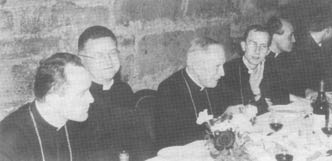
At the reception following the Jubilee ceremony. Above (L-R) Bishop Fellay, Fr. Aulagnier (first assistant to the Superior General), Archbishop Lefebvre, Bishop Tisserais de Mallerais, Fr. Boïvin (District Bursar of France) and Fr. Natterer (Rector of the German Seminary).
Below (L-R) Fr. Couture (Superior in Ireland), Fr. Laisney (District Superior in USA), Fr. Simoulin (Rector of the Seminary at Ecône), Bishop Williamson, Fr. Schmidberger (Superior General), and Bishop de Galarreta.
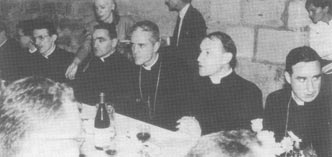
Modernists' Methods
Only after the sentence of excommunication, by an inversion of the logical order, whereby if Archbishop Lefebvre is wrong he should be declared heretic before being declared schismatic, will there be an extremely vague allusion to Archbishop Lefebvre's "heresy." On what point? On the concept—note this!—of "Tradition." Sure enough! Because to be able to insert within Tradition the uninsertable texts of Vatican II and so make Archbishop Lefebvre wrong on the doctrinal plane, the whole concept of Tradition will have to be changed, no less. So long as the concept of Tradition will remain what the Church has always held it to be, and what the Councils of Trent and Vatican I have defined it to be, Archbishop Lefebvre will be right and Rome, occupied by the modernists, will be wrong. Thus, without meaning to, the modernists are confessing out of their own mouths the irreconcilability of their "novelties" with Tradition.
Their behavior towards Archbishop Lefebvre is no surprise to anyone who knows the system followed by the modernists during the Council and perfectly illustrated by Msgr. Colombo, Paul VI's "theologian:" "Let us now change," he said, "episcopal collegiality. Afterwards we will find the theological reasons to justify it." With these modernist methods, Archbishop Lefebvre, simply because he made a doctrinal objection, found himself to be secretly "schismatic" from 1978 on, and we should not be surprised if sooner or later he is also declared "heretical," the only reservation being that the reasons will be found afterwards to justify such a declaration.
The "Olive Branch"
For years now, Archbishop Lefebvre has been patiently continuing to dialogue with listeners willfully deaf on the question of doctrine. At last, on July 8, 1987, insisting on the proper framing of the question, he writes to Cardinal Ratzinger, Cardinal Seper's successor: "Eminence, after nigh on twenty years of insistent requests that the experiment of Tradition should be encouraged and blessed, requests which have remained without reply, this is undoubtedly my last appeal both before God and before the history of the Church; the Holy Father and you too will bear the responsibility of a definitive break with the past of the Church and its Magisterium. The Magisterium of the present time is not sufficient in itself to be called Catholic, unless it is the transmission of the deposit of the Faith, that is to say, of Tradition. A new Magisterium, without roots in the past, and, even worse, in opposition to the Magisterium of all time, can only be schismatic, if not heretical. A persistent will to annihilate Tradition is a will to commit suicide, which by itself alone authorizes true and faithful Catholics to take all the necessary initiatives to ensure the survival of the Church and the salvation of souls" (Archbishop Lefebvre and the Vatican, p.24)
To such an ultimatum on the part of a long since "disobedient" bishop, it would be logical for the Holy Office, if it really considers the Archbishop to be in disobedience, to respond with appropriate measures. From Rome, on the contrary, comes the... dove with the olive branch. By way of reply, Cardinal Ratzinger proposes a series of solutions for the "Lefebvre case," but on the exclusively practical plane, shirking yet again the doctrinal question. For Cardinal Ratzinger, to tell the truth, there is no doctrinal question, since amongst other things he proposes the recognition of the "charism" proper to the Priestly Fraternity founded by Archbishop Lefebvre, which charism consists precisely in guarding and defending the Church's Tradition! This unexpected tactic of the extended hand, passing over any question of doctrine, clearly aims at reversing the positions in front of public opinion. By demonstrating the non-existence of the state of emergency to which Archbishop Lefebvre makes reference in his letter, the "generous" Roman proposals on the practical plane will off-load on him the responsibility for the future break, which is on the contrary, primarily on the doctrinal plane. And this is so whether he refuses to negotiate or in the course of negotiations, refuses unacceptable compromises; an eventuality not difficult to foresee. The fact remains that the ensuing negotiations feed the illusion that the "Lefebvre case" is capable of an easy and happy resolution, which is not the case: the doctrinal question, still and always unresolved, necessarily sets the parameters for any negotiation on the practical plane.
I Hope They Will Be Logical, But...
"What will be the result of Cardinal Gagnon's visit," asks Archbishop Lefebvre in a sermon on December 13, 1987, "it is very difficult for me to tell. In Rome, recognizing the benefits of this resistance and of keeping the Catholic Faith in people's hearts and minds, they should as a logical consequence help us in keeping this Catholic Faith. I hope they will be logical... but I am absolutely not sure that they will. Their minds are so poisoned by these theories weighing heavily down at present upon the whole modernized and modernist Church, that it would not surprise me in the least if they seek by all means to bring about our coming closer to them and to the spirit of the Council" (Fideliter, January-February 1988).
The course taken by the negotiations, and then the explicit declaration of Cardinal Gagnon, confirm that such precisely is the "reconciliation" being sought after by Rome, and for this reason no reconciliation will be possible so long as the doctrinal question has not been tackled.
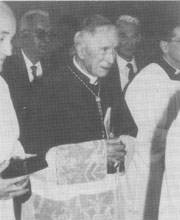
The 84 year old Archbishop on his way to Vespers.
"It Is Not Our Selves At Stake"
Once the negotiations failed, Cardinal Ratzinger spoke on Italian television of a "traumatic" distrust on the part of Archbishop Lefebvre. No: it is a lucid and logical distrust. Unity of communion in the Church is based on unity of Faith (cf. Leo XIII Satis Cognitum). Whenever there is no unity in the Faith, either in whole or in part, there can be no unity of communion.
"We cannot," said Archbishop Lefebvre in the following September to the Ecône seminarians, "lend a hand to the demolishers of the Church who in their other hand grasp a hammer to do the demolishing! We must get clear what we are after: either we truly wish to build up the Church or we wish to demolish it. If we side with the demolishers, if we rest ourselves on their authority, then by that very fact we also approve, indirectly if not explicitly, of their destruction of the Church. We cannot say that everything is resolved between us. That would be deplorable." And, alluding to those who have thrown in the towel, contenting themselves with profit-taking from Archbishop Lefebvre's umpteenth sacrifice, he goes on to say, "We suffer from being abandoned by all those who have grown tired of finding themselves for so long in a situation delicate, difficult, hard and painful. But we must not grow tired, because what is at stake is not our selves, it is the Faith, Tradition, the continuity and growth of the Church. Therefore we do not have the right to say, 'I am tired of struggling, now I wish to submit to authority,' when that authority is not defending the Faith" (and is working to demolish it).
State of Emergency
"The misfortunes of the Church, henceforth obvious to all, can only get worse for as long as those who are at the helm of the church will not bring it back onto the old course it always used to follow," wrote Archbishop Lefebvre on February 26, 1978 to Cardinal Seper; and events proved him right. Now, the breakdown of negotiations with Rome has cast down all hope of any short-term resolution of the crisis in the Church. All that remains is to continue in the future as in the past; providing for souls in a state of emergency, until at the helm of the Church there is the necessary correction of course.
Moral theology teaches: 1. that there can be a state of emergency not only for the body in goods of the material order, but also for the soul in goods of the spiritual order... 2. that in such a case one is bound to go to the help of souls in a state of grave emergency (namely such as would otherwise find themselves deprived of that necessary for their eternal salvation), even at grave inconvenience to oneself, and, if the duty of one's office requires it, even at the cost of one's life (if. Roberti Palazzine, Dictionary of Moral Theology,ed. Studium, Rome, under 'necessity'). To go to the help of souls in a state of emergency, Archbishop Lefebvre has already incurred a suspension "a divinis," as unjust as it was invalid. As a bishop, there is one last thing he can do: convey the power of episcopal Orders by itself (the accompanying power of jurisdiction falls outside his powers to convey) to persons he can trust to carry on his work, with the same love as he has for Rome and for the Papacy and in the same spirit of resistance to whatever is demolishing the Catholic Church from within. To do this, Archbishop Lefebvre must break the laws presently controlling the exercise of the bishop's power of Orders, but moral theology also teaches that a state of emergency of souls, even more than that of bodies, excuses one from observing the law. This means that by virtue of such a situation, in particular circumstances for a particular subject, the duty to observe the law ceases—be it prescriptions of the natural law, God's positive law, or human law—with the exception of prohibitions of the natural law, because these forbid acts intrinsically evil (cf. op. cit. under 'necessity' and 'excusing causes').
"There are extreme cases," said the great Bishop of Poitiers, Cardinal Pie, "in which disciplinary norms lose their force, giving way to divine law. What do I mean? There are cases, even ordinary cases—Jesus Christ is my guarantee—in which divine law is eclipsed by natural law. 'Which of you,' said the Divine Master, 'shall have an ass or an ox fall into a pit, and will not immediately draw him out, even on the Sabbath day' (Lk. XIV, 5)? Now, if a law gives way for such a reason, what shall we say when at stake is not just the saving of the life of a daughter of Abraham, but the coming to the aid, in an extreme danger, of the common Mother of all men, the Spouse of Christ, the Church of God? 'Was it not necessary to save this daughter of Abraham too' (Lk. XIII, 16)? (Speech for the reception of the relics of St. Emilian, Nov. 8, 1859, Works Vol. III, p. 504). And so Archbishop Lefebvre, "taking counsel of his common sense, as of his faith and his courage" (same speech), goes ahead with the pre-announced episcopal consecrations.
Today, more than one year later, it seems obvious that he has not founded a new "Church" with a new hierarchy in opposition to the Roman Catholic Church: he has simply guaranteed for souls in a state of emergency the means of salvation proper to the Catholic Church, until this very grave situation in the history of the Church has passed by. When the crisis is over, justice will be done to the uprightness of his intentions, as of his acts. One year ago, however, the episcopal consecrations had the effect of Archbishop Lefebvre, schismatic in secret, being officially declared "schismatic." This, without the ex-Holy Office ever having taken the trouble to pronounce on the doctrinal question which for years he had been raising, and from which was born the state of emergency for souls, and so for himself. Thus, the "Lefebvre case," always incorrectly approached, was, officially, even more incorrectly, closed.
